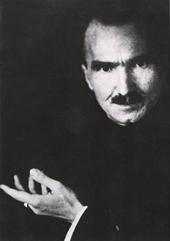Nikos Kazantzakis was born on 18th February 1883 in Heraklion in Turkish occupied Crete. He received basic elementary education in a school in Heraklion. During the great Cretan Revolt his family took sanctuary on the island of Naxos. T here the young Kazantzakis studied in the French Commercial School of the Holy Cross for two years (1897-1899). Whilst there, he learned about western culture from French literature . In 1902, he completed his high school studies in Heraklion and then went to Athens to study at the university . In 1906, he gained a first class law degree from the University of Athens, but he never took up the profession. From the following year and up to 1910, he lived in Paris whilst he continued his studies. He was greatly influenced by the teachings of Bergson and Nietzsche .
In Heraklion in 1911, he married Galateia Alexiou and then they moved to Athens. T heir marriage lasted a total of fifteen years. He served as a volunteer in the Greek Army during the Balkan Wars, 1912-13. In 1914, he met Angelos Sikelianos and together they toured the Mount Athos (Aghion Oros), and the whole of Greece. He met with Zorbas and together they created the failed business venture of the Prastova of Mani, mines to extract lignite. In 1919, Eleftherios Venizelos appointed him General Manager of the new Ministry of Public Relief, responsible for saving approximately 150,000 decimated Greek refugees expelled from Caucasus. These refuges were repatriated and established in the regions of Macedonia and Thrace .
His restless spirit for travel started whilst he was a foreign correspondent for Greek newspapers and he continued his travels for the duration of his lifetime. Austria, Germany, Czechoslovakia, Italy, Egypt, the United Kingdom, Spain and Russia, to name a few of the many countries he visited. In 1924, he met Eleni Samiou , who became his brave and loyal companion. They chose to reside in the island of Aegina, where they established their ‘own castle'. They were married in November 1945, with Angelos Sikelianos as their Best Man.
In 1945, he became actively involved in politics and formed the ‘Socialist Workers Union'. His interest in politics had blossomed in his youth. In the November of the same year he was sworn in as a Minister without Portfolio in the Sophoulis' government, a position he resigned from after only 6 weeks.
In 1946, the Greek Society of Writers, of which he was president, proposed him and Sikelianos for the Nobel Prize. Ten years later he was presented with the International Peace Award in Vienna. In 1947, he was appointed Director of the Classical Translations Department of UNESCO.
He moved to Antibes in southern France in 1948. For a few pages in ‘Capetan Michalis' and for ‘The Last Temptation of Christ' the Greek Orthodox Church tried to excommunicate him in 1953. This created a commotion that lasted some months . The Pope also listed ‘ The Last Temptation of Christ ' among the prohibited books of the Roman Catholic Church.
He died on 26 th October 1957 in the University Hospital of Freiburg in Germany at the age of 74. His body was returned to his beloved island of Crete and was interred in the Martinego Rampart, of the Venetian Walls of Heraklion on 5 th November.
